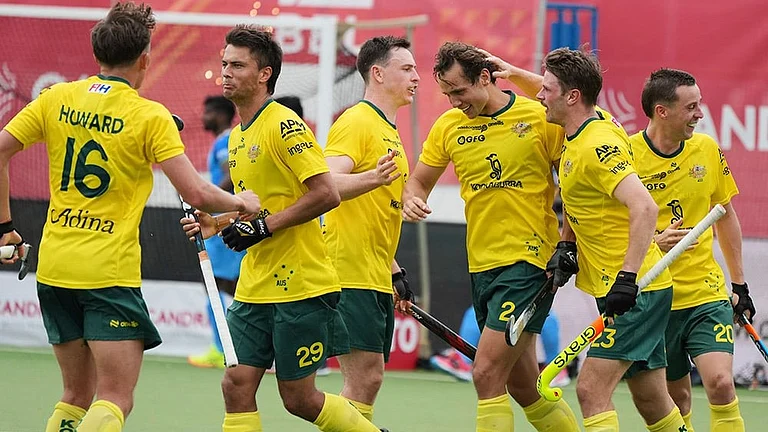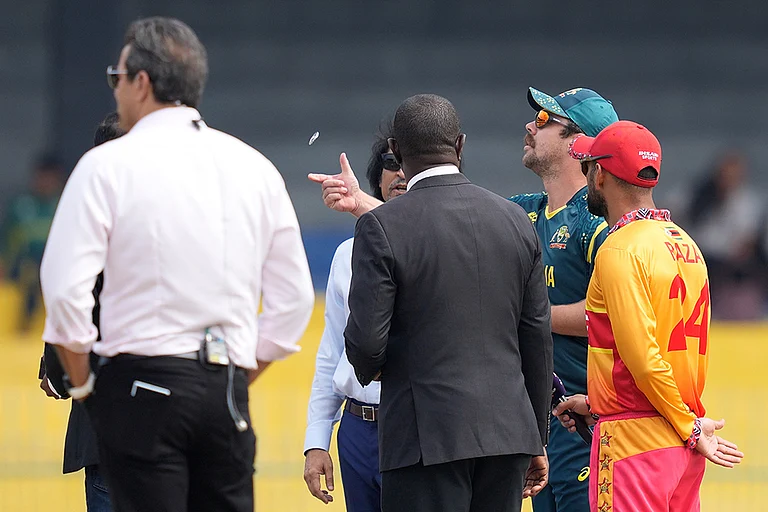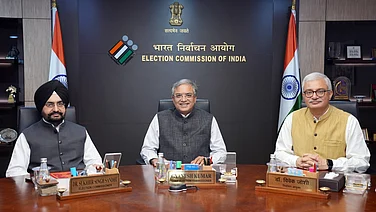Twenty-one-year-old Sudhman Gowde had been in a cheery mood a day after the New Year festivities on January 1 when news of violence started pouring into the remote Chinnari village in Narayanpur district on the northwestern border of Bastar where he lives. Violence had broken out across nearby villages where Adivasis were attacking the homes of Vishwasis (tribals following Christianity). Churches had also been attacked. Gowde felt nervous but he was not too worried. “I grew up in this village and I have been practising Christianity since 2016,” he says. “I’ve never felt any animosity before. It was only since last year that tensions began.”
On January 1-2, violence broke out across the villages of Narayanpur including the district centre where Adivasis attacked and clashed with Vishwasis. Both sides clashed in places like Gorra village. Christian tribal families were asked to renounce Christianity or leave the village by village elders and religious heads like the Patels, Gayetas and Parmas. If they refused, they faced the threat of violence. There was no room for negotiation. “Mobs were arriving armed with self-styled weapons and swords. There was no choice but to leave,” says Gowde, who has a disability in his legs. He and his family, including his children, ran into the cold January night and took shelter at a relief camp in Narayanpur town. They returned in March, only to be attacked again. “I have four sisters. Villagers instigated by outside mobs beat up two of my elder sisters,” he says.
Mangal Gowde, one of the village authorities and a practising Hindu Adivasi, has yet again issued a dictum against the ‘dharmantrit’ (religious convert) families. The ultimatum remains the same: total ghar wapsi or no acceptance in Adivasi society.
It is notable that while tribals practising Christianity are considered ‘dharmantrit’, the same does not apply to Adivasis who have adopted Hinduism. Indigenous Adivasis are not Hindus but rather nature worshippers with each tribal community or grouping following its own distinct religious and cultural practices. Much like in other Adivasi-dominated areas such as the Dang-belt in Gujarat, the 90s and early 2000s in Bastar and surrounding tribal zones saw efforts by right-wing-led organisations to bring tribals into the ‘Hindu fold’. Be it through the distribution of pocket-sized copies of Hanuman Chalisa, the Ramayana or the Bhagavad Gita and photographs of Hindu deities to rural tribal households, or the attempts to assimilate tribal customs and deities with existing Hindu traditions. Even indigenous Adivasi names were Hinduised. Innari village, for instance, became Chinnari. Massa Karma who started the Salwa Judum movement to hunt Maoists in Bastar became Mahendra Karma. In the last five years, the Congress has also worked on bringing Adivasi religion to the fore through its ‘Devgudi’ scheme which assures the construction of ‘gudis’ or temple-like structures to commemorate indigenous Adivasi deities and spiritual sites across villages, starting with Dantewada district.
The question of who is an Adivasi appears political rather than technical. The politics is evident in the demands by groups like Janjati Surakhsa Manch led by RSS ideologues and BJP workers actively propagate Hinduism among tribal belts to expel Adivasis converting to religions (other than Hinduism) from the Scheduled Tribes list.
“Vishwasis have been living in these parts for many decades,” says Father Jomon Devasia of the Sacred Heart Church in Banglapara, Narayanpur, which was attacked by a mob of non-Christian Adivasis on January 2. “This Church itself just celebrated its golden jubilee,” he says, adding that the matter of “forced conversions” appeared largely to be a politically concocted narrative.
The conflict between Adivasis and Vishwasis has gained ground in the last five years after BJP leader Kedar Kashyap lost the seat to Chandan Kashyap of the Congress in 2018. The Janjati Surakhsa Manch, working for indigenous rights in tribal belts across the country, has been active in the Narayanpur region since, travelling from village to village and holding meetings of Hindu and indigenous Adivasis. Many Vishwasis believe the group was actively spreading propaganda against Christian tribals. Janjati Surakhsa Manch’s Bastar chapter chief, former BJP MLA Bhojraj Nag says that the Manch’s work revolves around stopping “illegal conversions”. “They (Christians) try to recruit people into their faith by spreading their propaganda in secret meetings,” he says. “Wandering pastors and priests go from village to village seeking to convert tribals to Christians,” he adds. The Manch preaches a return to ‘mool dharma’ of Adivasis.
“Converting to Christianity (dharmantar) requires a legal and theological process that takes several years and training. Not a single tribal in Narayanpur has ‘converted’ to Christianity in that sense. We just practise it as part of our faith,” says tribal Christian leader Fulsingh Kachlam. A social activist, Kachlam is a first-time poll candidate contesting the Narayanpur elections with a Communist Party of India (CPI) ticket. Sitting on a bare plastic chair in the courtyard of his home from where he has been running his poll campaign, Kachlam says that communalising tribal identity is a political smokescreen to hide the government’s failure in addressing the real issues that Adivasis face. The CPI candidate who is a resident of Narayanpur has been drawing support from the Vishwasi community ahead of the crucial 2023 elections. “If the BJP returns, the Vishwasis in this area may face further threat,” he says.
Meanwhile, BJP leaders in the area have also been living in fear of attacks by Naxals. Three days ahead of the elections, a BJP worker was killed in Kaushalgarh village while campaigning for his party. The Naxals have also issued parchas containing open threats against other BJP leaders in Bastar. Support from local communities is essential to the party as it acts as a buffer between the party and the Naxals, locals claim. For Vishwasis, the Naxals are politically irrelevant as the latter’s fight is not about religion.
Sister A (name withheld), who has been serving at the Banglapara church for over a decade says that in many villages including hers, church workers are attacked, harassed or stopped from going to services. Several churches or prayer/congregation halls of Vishwasis have been taken over by Adivasi villagers. On the day the church was attacked, her son, a Class 9 student, was in class at the Viswadeepti School inside the church’s premises. Mobs entered the church premises and started vandalising the school while classes were going on.
Father Devasia confirms that a mob of about a hundred stormed in. He had got a call from the police warning him of the attack moments before, giving him enough time to lock the children up in a safe zone and instruct his staff to phone their parents.
“This school caters not just to Christians but to Hindus, Adivasis and Muslims too. But the mob was drunk and armed and we were afraid it would not stop to ask questions first,” Sister A said. The mob vandalised the statue of Christ and many of the specially designed church windows. That same day, three other churches in nearby villages were vandalised.
After nine months, many windows inside the Narayanpur church remain broken—a reminder of the violence. Vishwasis like Gowde who have returned to their village feel abandoned by their government and politicians. While the BJP has the support of Adivasis, Vishwasis feel attacked by the former and abandoned by the Congress.
“We have been left to fend for ourselves and we will fight back through the right constitutional channels,” says Sudhman Gowde, who refuses to renounce Christianity or leave his village. “The Constitution gives everyone, including Adivasis, the right to believe in whichever god we like. It is our fundamental right and we will not be bullied,” he says.
Rakhi Bose & Raunak Shivhare in Narayanpur


























